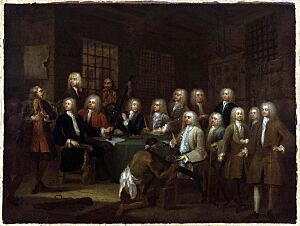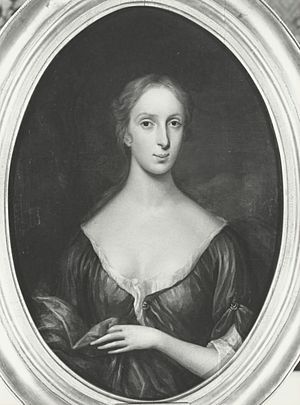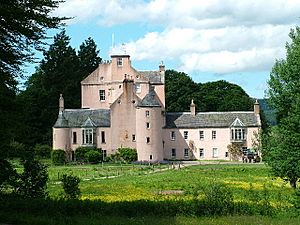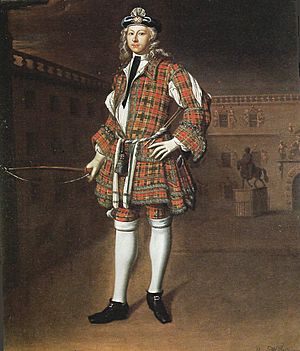Sir Archibald Grant, 2nd Baronet facts for kids

Sir Archibald Grant, 2nd Baronet (born September 25, 1696 – died September 17, 1778) was an important person from Monymusk, Scotland. He was a businessman and a politician who served in the House of Commons from 1722 to 1732. He had to leave the House of Commons because of problems with a company called the Charitable Corporation. After that, he went back to Scotland and worked on making his family's land better.
Contents
Early Life and Family Connections
Archibald Grant was the oldest son of Sir Francis Grant, 1st Baronet. His mother was Jean Meldrum. Archibald's father was a judge who bought the Monymusk estate in 1713. When his father passed away in 1726, Archibald became the owner of Monymusk and also inherited the title of Baronet.
Archibald studied law. He became a Scottish lawyer in 1714 and later a lawyer in England.
Time in Politics
In 1722, Archibald Grant was chosen to be a Member of parliament for Aberdeenshire without anyone running against him. He was elected again in 1727.
In 1729, he joined a special group in Parliament called the Gaols Committee. This committee, led by James Oglethorpe, visited prisons like the Fleet and Marshalsea to check on the conditions for people who owed money. Archibald Grant was asked to leave the House of Commons on May 5, 1732, because of his involvement in problems with a company.
The Charitable Corporation Issues
In London, Archibald Grant became involved in buying and selling shares of companies. He joined the board of directors for a company called the Charitable Corporation in 1725. He was already in debt to another businessman named George Robinson.
In 1727, Archibald Grant joined a group of five people to invest in the Charitable Corporation's shares. This group was managed by Robinson. The other partners were William Burroughs, William Squire, and John Thomson.
Mining Ventures
Archibald Grant also had interests in mines. After his second marriage in 1727, he became involved with mines in Eyam Edge, Derbyshire, and Oden in Castleton, Derbyshire. These mines were doing well at first.
Grant also bought mines in Strontian, Scotland, for a small amount of money. He sent miners from Derbyshire to work there in 1729.
Grant told his partners in the Charitable Corporation about some mines in Scotland. He suggested that another company, the York Buildings Company, should rent these mines. This was meant to make the York Buildings Company's shares more valuable. Grant and his partners then bought shares in the York Buildings Company, and their value went up.
While Grant was in Scotland, his partners bought even more shares. They used money from the Charitable Corporation for these purchases, which caused big problems. Eventually, their plans failed. Robinson and Thomson ran away because they couldn't pay their debts. The whole situation was investigated by the House of Commons. This investigation led to Archibald Grant being asked to leave Parliament.
Other Business Activities
In 1728, Archibald Grant and his brother-in-law, Alexander Garden, rented several large estates from the York Buildings Company. They leased the Southesk, Marschal, Pitcairn, and most of the Panmure estates for 29 years.
Life After Parliament
After leaving the House of Commons, Archibald Grant went back to Scotland. He spent his time improving his Monymusk estate. He supported local businesses, like making linen. He also brought new farming methods from England, such as letting land rest (called fallow) and planting new crops like clover and ryegrass to help the soil.
In 1747, Grant tried to get elected for Aberdeenshire again, but he stopped when he learned that a powerful person, the Duke of Argyll, was supporting someone else.
Archibald Grant wrote two books about farming: The Farmer's New-Year's Gift (1757) and The Practical Farmer's Pocket Companion (1766). A famous philosopher, David Hume, once said that planting trees was "the only laudable thing he has ever done."
Family Life

Archibald Grant was married four times.
- His first wife was Anne Hamilton. They had three daughters.
- His second wife was Anne Potts. She was the mother of his son and heir, Sir Archibald Grant, 3rd Baronet.
- His third wife was Elizabeth Callander.
- His fourth wife was Jane Millar.



